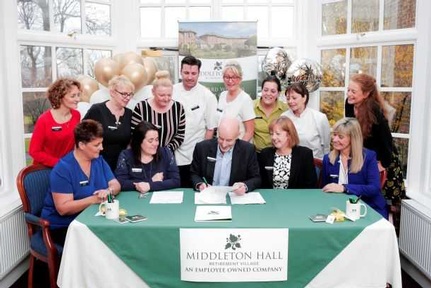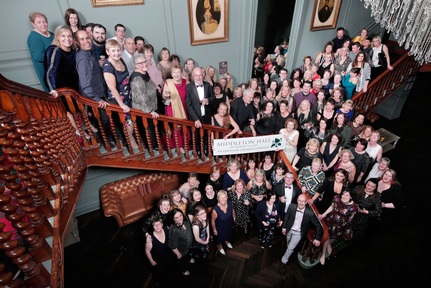Care home hands control of business to staff giving them 'security' and 'a voice'
Middleton Hall, a retirement village in Darlington, is now fully employee owned, with staff saying “employee ownership makes us feel valued as we are all co-owners of the business”.

It is the first care home in the UK to become employee owned following in the footsteps of John Lewis, the largest employee-owned company in the UK, which is also run as an Employee Ownership Trust. The Trust which is made up of two employee trustees (voted from an eight-strong co-owner forum), two directors and an independent chair, will hold the shares on the behalf of the employees.
The home’s managing director, Jeremy Walford, who was the main shareholder, told Middleton Hall’s 190 staff that his aim was to preserve the ethos and values of the business he had built.
He said: “My motivation over the last 22 years has been driven by the desire to build a business that makes a difference to our customers and staff rather than purely for financial reward. I am aware that in selling a company you never know who you are really selling to in the long term and I have seen good companies in our sector ending up barely a shadow of the business they historically had been, after being bought out. I now feel a responsibility for ensuing Middleton Hall continues with the vision of being the best.”
An Employee Ownership Trust benefits the owner as when they sell the company shares to the Trust, they don’t have to pay capital gains tax. While employees gain from tax-free cash bonuses and they have more influence and more of a voice.
Research shows employee owned companies have better job satisfaction, recruitment and retention
Sue Gell, manager of Independent Living with support at the retirement village, called the change in ownership “exciting” and said: “It gives employees security that Middleton Hall as we know it, keeps its values because we are not selling to another organisation that may have changed the ethos. Personally I feel it gives employees the confidence to ‘instigate change’ and have more of a voice.”
She added: “Financially, if we as a company continue to perform we will all equally benefit from profit share as everyone plays an integral part in delivering the service to our residents.”
Jan Hargrove, the care home’s marketing co-ordinator, believes it is “an extraordinary opportunity” and said: “Given our strong culture of teamwork and values, we are in a great place to build on success in the future. I think it is an exciting time, interesting and challenging in its own way.”
Gail Jones, who is the receptionist at Middleton Hall, is its first employee trustee. She said: “I am delighted to have been elected to the role of Trustee for Middleton Hall and am overwhelmed by the support from colleagues. I am looking forward to representing the interests of all services and I feel I will be a positive role model in promoting the benefits of employee ownership.”
MIddleton Hall has gone from failing to a successful and profitable company
Jeremy Walford has spent the last two decade growing Middleton Hall from a struggling nursing home into a thriving retirement village with its own spa.
He said: “For most of the 20 years it has been majority owned by myself and I have taken considerable personal financial risk to turn the company from failing to a successful and profitable company.
“During the major physical redevelopment, considerable debt was taken on to finance the increasingly bold developments from the initial £20,000 loan in 1999 to over £4m in 2011. As a result of the successful developments, the debt has been largely paid down and the company is financially stable.”
He reveals that his options were to expand or sell out and admitted he had been approached about selling the business.
However he added: “If I was to sell the company in a trade sale (to a bigger company or group), I would gain considerable personal wealth. But I would lose control of the elements of the business that are very important to me – vision, values and long-term legacy.

“I am also aware that in selling a company you never know who you are really selling to in the long term as the acquiring company at some point may well be acquired themselves and the leadership and vision changes. I have seen that happen to a number of good companies in our sector that have ended up barely a shadow of the business they historically had been when run by a caring owner.
“Middleton Hall is attractive as an acquisition as it is profitable and generates cash. For a company with a portfolio of retirement villages or care homes, the likely outcome would be use that cash to invest in other sites rather than continue to re-invest in improving quality at Middleton Hall.”
He foresees that as Middleton Hall has passed through a period of major development and risk, it is now entering a period of steady sustainable profits.
"This would normally mean that shareholders are paid higher dividends to reflect increased profitability. I feel we should share that financial reward in the future more equitably," he added.
Mr Walford believes the home’s employees are the ones who are “committed to our vision and values” and so “are the most likely to maintain the ethos and spirit of the organisation in the long term”.
“Moving to an Employee Ownership Trust should sustain Middleton Hall for the long term, ensure continued re-investment, high staff engagement and customer focus. That is far more important to me than the personal wealth from selling the company to a third party”.
Middleton Hall Retirement Village was rated ‘outstanding’ by the Care Quality Commission in its last inspection in 2017. It also won a 2019 Top 20 carehome.co.uk award, which is based on reviews by residents as well as their family and friends.
carehome.co.uk lists a wide range of jobs within the care home environment. To search for jobs click here
click here for more details or to contact Middleton Hall Retirement Village
Latest News
 29-Jul-24
Dementia Bus gives carehome.co.uk staff insight into life with dementia
29-Jul-24
Dementia Bus gives carehome.co.uk staff insight into life with dementia
 01-Mar-24
Find out the top care homes in 2024
01-Mar-24
Find out the top care homes in 2024
 21-Mar-23
UK's top care homes in 2023 revealed
21-Mar-23
UK's top care homes in 2023 revealed
 03-Jan-23
carehome.co.uk launches free care helpline
03-Jan-23
carehome.co.uk launches free care helpline
 13-Dec-22
5 mins with Emily Whitehurst, chief operating officer for Constantia Healthcare
13-Dec-22
5 mins with Emily Whitehurst, chief operating officer for Constantia Healthcare